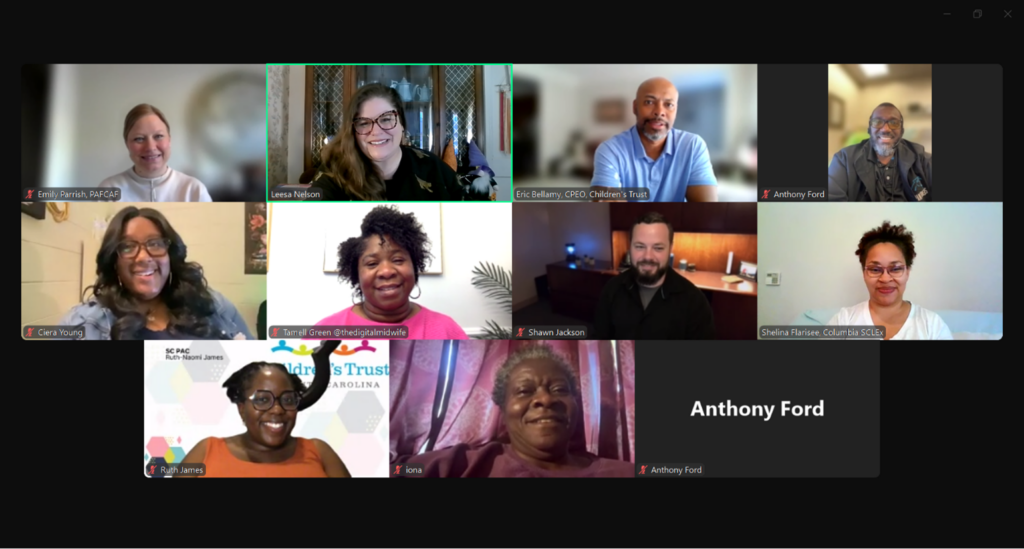The U.S. Surgeon General recently issued an advisory on the Mental Health and Well-Being of Parents. Spoiler alert: Many parents are struggling. Guilt and shame are “pervasive” and “perpetuate a vicious cycle where stress leads to guilt, which leads to more stress.”
The report identifies familiar parenting challenges and stressors, including “protecting children from harm, worrying about finances, managing teenagers who are searching for independence.” It also points out that today’s parents have new factors, like “the complexity of managing social media, concerns about the youth mental health crisis, and an epidemic of loneliness.”
We took this topic to the smartest group of parents we know—the Children’s Trust Parent Advisory Council, which provides input on child abuse prevention programs and services in South Carolina. This diverse group of parents from across the state has years of experience raising children. Here are some of their takeaways on how to manage stress.
Learning self-care can be a challenge.
In many classrooms today, teachers are weaving self-care into everyday learning so that kids have the habits to regulate their emotions, be mindful, protect their mental health, appropriately express themselves and learn. However, many parents don’t have that foundation and grew up in an era when your feelings were not validated, and stress was unimportant. Many caregivers have to learn self-care for the first time.
“It’s okay to prioritize yourself,” PAC Member Alice Matthews said. “Taking the time to take care of yourself is so important. It helps you become a better parent with more to give. You have to fill up your tank every day. It is a mind-shift change.”
Recognize the signs of stress – physical and emotional.
Are you reacting in a way that feels out of character? Parents need to listen to what their bodies may be saying: headaches, fatigue, muscle tension, catching a cold or another sickness because of a weakened immune system, skin reactions like acne or eczema, changes in weight because you may be a stress eater or lose an appetite during tense times. If you don’t feel how you usually feel, give yourself time to think about what is happening.
Culture. Culture. Culture.
Parenting practices to cope with stress can vary widely. One family may have active mindfulness and religious practices, while others may not. There are also varying attitudes towards seeking counseling, healthy work-life balance, gender-specific parenting roles, and organized religion. Recognize where you’re at and start there.
Intentional routines control the chaos.
The group shared how important intentional routines are for them: nighttime wind down, slow mornings, getting kids in bed on time, taking hot showers, reading a book, using essential oils, going early to be on time, and listening to music instead of watching screens.
“Being intentional about my nighttime routine leads to a slow morning, and that sets everything in motion for me and my kids to be less stressed,” said PAC Member Ciera Young. “This means I want to get the kids to bed on time, read a book, use essential oils, listen to music and get myself to bed on time.”
Get outside and use your hands.
PAC members regularly exercise outside, breathing fresh air, feeling the grass between their toes and walking. Several also shared how working outside, such as yard work, affords them a sense of accomplishment and opportunities to exhale and reset.
Isolation is bad for those giving and receiving help.
Communities must be proactive in how they come together, including having one-on-one conversations and ensuring that services are welcoming and in the right places. Caring for yourself when your family needs help is hard, if not impossible. It is important that we de-stigmatize asking for help and reduce those barriers. Having a decent salary doesn’t change the fact that a family could be struggling to meet its needs.
Family stress is directly related to family finances.
As much as we would like to wish away our stress with some deep breathing exercises, money is often at the root of the problem. For too many, the cost of living has exceeded wages, especially regarding food, housing and transportation.

Children’s Trust of South Carolina’s Parent Advisory Council meets to offer their perspective and wisdom on parenting topics once a month with SC Parents.
Interested in more practical tips on how to manage stress? Read 13 Simple Ways to be a Resilient Parent!





